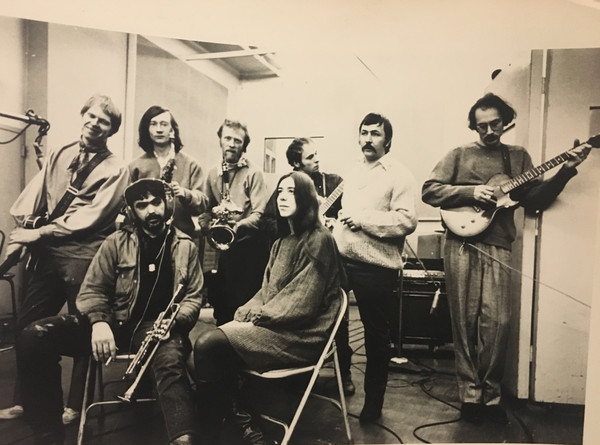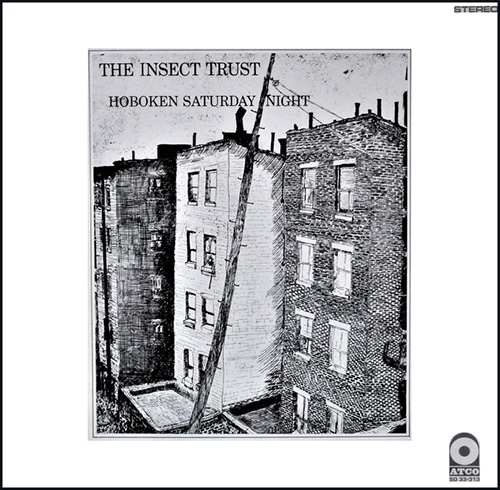Pynchon Music: Insect Trust
Twilit Side of the Moon
A.J. is an agent like me, but for whom or for what no one has been able to discover. It is rumored that he represents a trust of giant insects from another galaxy.
—William S. Burroughs, “The Naked Lunch”
The Insect Trust (1967–1971?)
Another late 60’s and early 70’s band indebted to Pynchon was called The Insect Trust. Its most famous member was the noted writer, critic, and ethnomusicologist Robert Palmer. Two albums, Insect Trust (Capitol 1968), and Hoboken Saturday Night (ATCO 1970), were produced. The music ranges from surreal folk-rock, to pop-soul in the style of Booker-T, to flat-out free jazz. It’s the latter style which is adopted on a song called “The Eyes of a New York Woman,” sung by Nancy Jefferies and accompanied by a haunting jazz descant recorder solo played in a true virtuoso style. The song’s composers are listed as Jeff Ogden and Thomas Pynchon, and the lyrics are taken verbatim from V., where they are sung by Benny Profane as he, Angel, and Geronimo are trying to pick up some girls (V. [1963; rpt. New York: Bantam Books, 1979], 127). When he sings his despairing song, all the girls can say is: “It doesn’t have any beat.” Fortunately, The Insect Trust version has a great beat. The whole piece is moody and lazy, just like a hot Hoboken Saturday night, and you are lost, perhaps, in the streets with the Whole Sick Crew, where “The eyes of a New York woman/ Are the twilit side of the moon.”
Rock critic Ed Ward offers a little more information on the band and their Pynchonian song on NPR:
The band was an odd group of people: free jazzers, hippie rockers, old-timey and country-blues musicians. The guitarist, Bill Barth, had been one of the re-discoverers of Skip James, while one of the saxophonists, Robert Palmer, had grown up next door to a black kid named Ferrell Sanders, who went on to call himself Pharoah. Partially, at least, the band’s members started out in Arkansas, where, calling themselves the Primitives, they made a little splash by recording a 45 that was immediately taken off the market because Thomas Pynchon sued them. They’d taken the lyrics from his novel V. without asking permission.
The band, such as it was—Barth, Palmer and vocalist Nancy Jeffries—drifted to Memphis after that and named itself after a sinister group in a William Burroughs novel: The Insect Trust. A baritone saxophonist, Trevor Koehler, joined up, as did Luke Faust, who’d made a name for himself around New York as a banjoist. Despite not having a rhythm section, the band played around town, and somehow got a recording deal with Capitol in 1968. The band’s album featured an odd mandala painted by Faust on its cover, and a bunch of songs that sounded like nothing else…
…The Insect Trust got a second chance a year later, thanks to a new manager who got the band signed to ATCO Records. By this time, the band was squatting in an apartment building in Hoboken, N.J., with a commanding view of the New York skyline from its roof. Barth, Jeffries and Palmer got together and wrote the title track, a celebration of their new home. Hoboken Saturday Night was even better than its predecessor. They were stretching out and finding new ground, and recorded the Pynchon song again (“The Eyes of a New York Woman”), this time with permission from its author. Robert Palmer’s recorder solo in that song is his finest moment on record, in my opinion, and Nancy Jeffries gives the words all she’s got.
It should also be noted that the band’s name is derived from a line in William S. Burrough’s The Naked Lunch; which hardly makes them unique in the world of rock music! However, they came across the moniker indirectly, from an issue of Insect Trust Gazette, a short-lived literary magazine published from 1964–1968.
Lyrics
“The Eyes of a New York Woman”
The eyes of a New York Woman
Are the twilit side of the moon
Nobody knows what goes on back there
Where it’s always late afternoon
Are the twilit side of the moon
Nobody knows what goes on back there
Where it’s always late afternoon
Under the lights of Broadway
And far from the lights of home
With a smile just as sweet as a candy cane
And a heart all plated with chrome
And far from the lights of home
With a smile just as sweet as a candy cane
And a heart all plated with chrome
Do they ever see the wandering bums
And the boys with no place to go
All the drifter yeah he cried for an ugly
He left her in Buffalo
And the boys with no place to go
All the drifter yeah he cried for an ugly
He left her in Buffalo
Dead as the leaves in Union Square
And dead as the graveyard sea
The eyes of a New York woman
Will never cry for me
They’ll never cry for me
And dead as the graveyard sea
The eyes of a New York woman
Will never cry for me
They’ll never cry for me
Additional Information
Hoboken Saturday Night
The Insect Trust
The Insect Trust
ATCO, 1970
Track Listing
1. Be a Hobo (0:35)
2. Hoboken Saturday Night (3:00)
3. The Eyes of a New York Woman (3:08)
4. Ragtime Millionaire (3:20)
5. Somedays (2:47)
6. Our Sister the Sun (7:20)
7. Reciprocity (3:23)
8. Trip on Me (2:45)
9. Now Then Sweet Man / Mr. Garfield (3:07)
10. Reincarnations (3:15)
11. Glade Song (3:00)
12. Ducks (5:40)
2. Hoboken Saturday Night (3:00)
3. The Eyes of a New York Woman (3:08)
4. Ragtime Millionaire (3:20)
5. Somedays (2:47)
6. Our Sister the Sun (7:20)
7. Reciprocity (3:23)
8. Trip on Me (2:45)
9. Now Then Sweet Man / Mr. Garfield (3:07)
10. Reincarnations (3:15)
11. Glade Song (3:00)
12. Ducks (5:40)
Musicians
Bill Barth—lead guitar, steel guitar.
Nancy Jeffries—vocals.
Robert Palmer—alto saxophone, clarinet, recorder.
Trevor Koehler—baritone saxophone, soprano saxophone, piccolo, flute.
Luke Faust—harmonica, banjo, fiddle, electric guitar.
Donald MacDonald—drums.
Bernard Purdie—drums.
Charles Buddy Nealy—drums.
Bill Barth—lead guitar, steel guitar.
Nancy Jeffries—vocals.
Robert Palmer—alto saxophone, clarinet, recorder.
Trevor Koehler—baritone saxophone, soprano saxophone, piccolo, flute.
Luke Faust—harmonica, banjo, fiddle, electric guitar.
Donald MacDonald—drums.
Bernard Purdie—drums.
Charles Buddy Nealy—drums.
Elvin Jones—drums.
Charles Macey—rhythm guitar, bass.
Bob Bushnell—bass.
Joe Macho—bass.
William Folwell—bass, trumpet.
Warren Gardner—trumpet.
Hugh McCracken—rhythm guitar.
Ralph Casale—rhythm guitar.
Charles Macey—rhythm guitar, bass.
Bob Bushnell—bass.
Joe Macho—bass.
William Folwell—bass, trumpet.
Warren Gardner—trumpet.
Hugh McCracken—rhythm guitar.
Ralph Casale—rhythm guitar.
Listen to Hoboken Saturday Night — Listen to the entire album on YouTube.
Listen to “The Eyes of a New York Woman” — Listen to their version of Pynchon’s song from V.
Insect Trust Wikipedia Page — You can read more about the Insect Trust on Wikipedia.
Insect Trust Discog Page — Collects album covers and information on the Insect Trust’s releases.
Tribute and Interviews by Billy Bob Hargus — A set of interviews with the band members.
Robert Christgau — Collectors’ Choice Music, 8 March 2005. Noted rock critic Robert Christgau on the Insect Trust.
Insect Trust Gazette Part 1 — Reality Studio, 23 April 2006. Jed Birmingham discusses the literary magazine Insect Trust Gazette.
Insect Trust Gazette Part 2 — Reality Studio, 25 May 2007. Original editor Jed Irwin answers questions about the Insect Trust Gazette. Includes a brief mention of the band.
The Insect Trust: An American Band Deconstructed — NPR, 20 November 2012. Ed Ward discusses the Insect Trust on Fresh Air.
Graded On a Curve: Hoboken Saturday Night — The Vinyl District, 16 November 2016. Michael Little reviews the album, with some thoughts on a whimsical Pynchon appearance.
Pynchon on Record
Return to the main music page
Authors: Dr Larry Daw & Allen B. Ruch
Last Modified: 10 November 2021
Main Pynchon Page: Spermatikos Logos
Contact: quail(at)shipwrecklibrary(dot)com
Last Modified: 10 November 2021
Main Pynchon Page: Spermatikos Logos
Contact: quail(at)shipwrecklibrary(dot)com




Karen Poliski
I was in Bill Barth’s last band before he died. He told us the story of how they landed the first record contract. As I recall it- Bill was at a record release party and was sitting on a couch next to some guy. Bill started criticizing the album talking to the guy next to him. That man was from capitol records. He asked if Bill if he thought he could do better? Bill said yes, of course. That guy signed the band to Capitol records! Thank goodness otherwise we wouldn’t have those recordings! Bill was an unbelievable character.